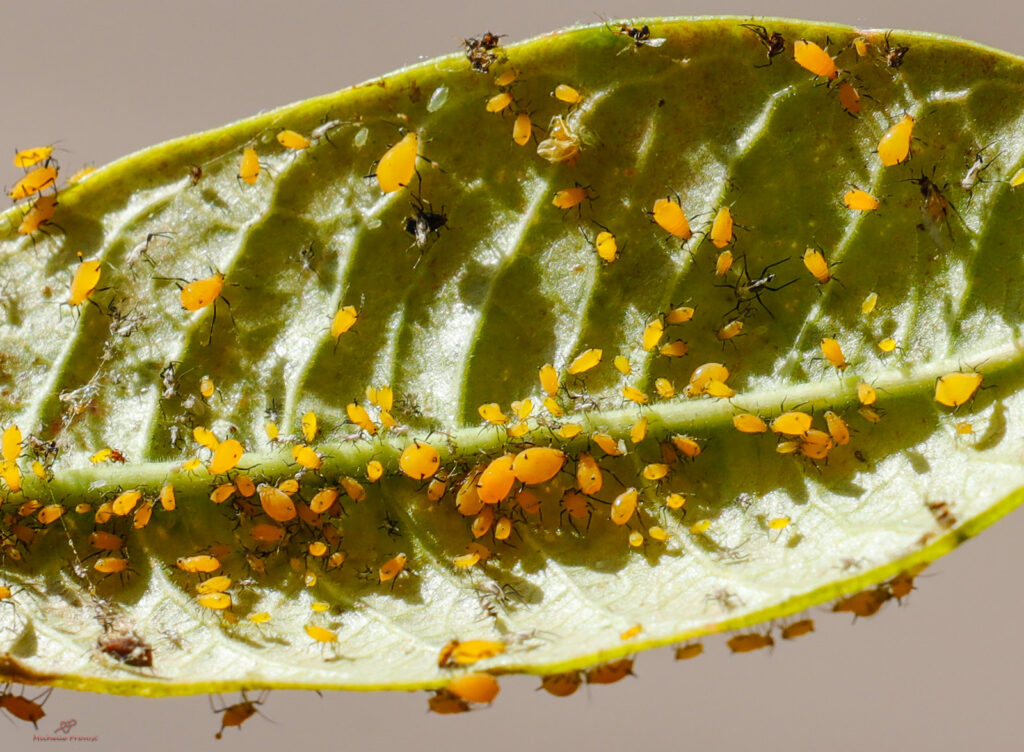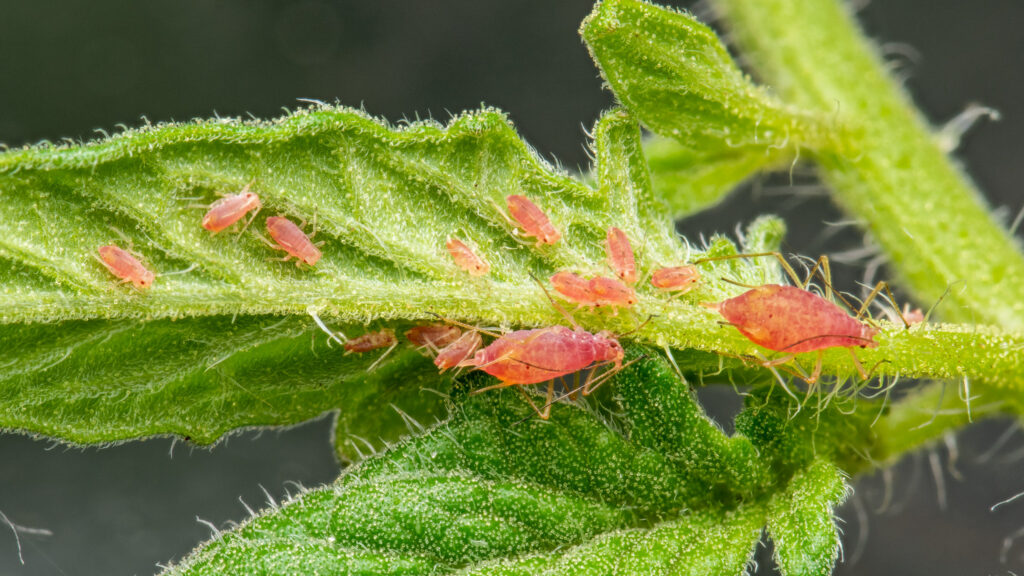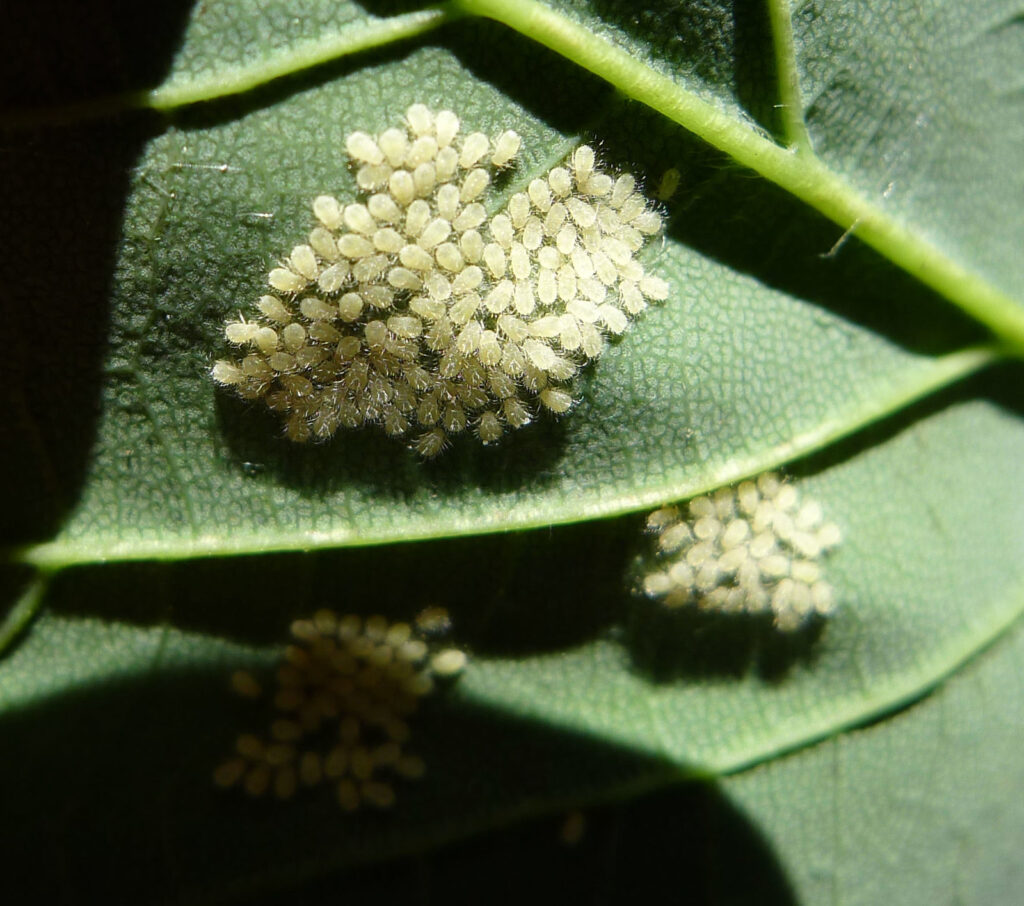Aphids are minuscule sap-sucking insects that can inflict substantial damage upon your garden if left unattended. These notorious garden pests reproduce rapidly and can wreak havoc on your plants by feeding on their sap, causing leaves to curl, yellow, or even drop prematurely. However, with the right strategies and knowledge, aphid management can become a manageable task.
In this comprehensive guide, we will delve into easy and effective ways to safeguard your garden from aphid infestations.
Identifying Aphids
To effectively manage aphids, it’s essential to be able to identify them with precision. Aphids exhibit a remarkable range of colors, such as vibrant green, pale yellow, deep black, or even soft pink. Their characteristic pear-shaped bodies are often misconstrued as tiny, teardrop-like insects.
What sets aphids apart is their tendency to cluster primarily on the undersides of leaves and along the stems of plants. These pests possess an astonishing ability to reproduce both sexually and asexually, which means their populations can skyrocket in a matter of weeks.

Natural Predators
Harnessing the power of natural predators is one of the most environmentally friendly and effective ways to manage aphids in your garden. Among the champions of aphid control are ladybugs, lacewings, parasitic wasps, and even some bird species.
These beneficial insects have a voracious appetite for aphids, making them invaluable allies in your pest management efforts. To attract these beneficial insects to your garden, consider planting nectar-rich flowers like marigolds, dill, and fennel. These blooms provide not only sustenance but also a habitat for these aphid-eating warriors, ensuring they stay and protect your garden.
Here are some natural aphid predators:
- Ladybugs (Ladybird Beetles): Ladybugs are perhaps the most well-known aphid predators. Both the larvae and adults of ladybugs feed on aphids. A single adult ladybug can consume dozens of aphids in a day, making them valuable allies in aphid control.
- Lacewings: Lacewings, particularly the green lacewing, are voracious aphid predators. Their larvae, often called “aphid lions” due to their ferocious appetite, feed on a variety of garden pests, including aphids.
- Parasitic Wasps: Certain parasitic wasps lay their eggs inside aphids. When the wasp larvae hatch, they consume the aphids from the inside, ultimately killing them. This natural parasitism can help keep aphid populations in check.
- Hoverflies (Syrphid Flies): Hoverflies resemble bees but are harmless and feed on nectar. Their larvae, however, are excellent aphid predators. Hoverfly larvae actively hunt and consume aphids, making them valuable for biological pest control.
- Predatory Beetles: Several beetle species, such as the aphid midge and the soldier beetle, feed on aphids. They can be effective in reducing aphid numbers when present in your garden.
- Birds: Some bird species, including sparrows, wrens, and finches, include aphids in their diets. Attracting birds to your garden by providing birdhouses, bird feeders, and bird baths can help control aphid populations naturally.
- Praying Mantises: While they are more generalist predators, praying mantises will readily consume aphids when given the opportunity. They can serve as beneficial insects in your garden’s ecosystem.
- Spiders: Certain spider species, such as crab spiders and orb-weaver spiders, will capture aphids in their webs and use them as a food source. These spiders can contribute to aphid control in your garden.
- Ground Beetles: Ground beetles are nocturnal predators that feed on a variety of garden pests, including aphids. Providing suitable habitats for ground beetles, such as mulch or ground cover, can encourage their presence.
- Predatory Bugs: Insects like the big-eyed bug and damsel bug are natural predators of aphids. They pierce aphids with their sharp mouthparts and feed on their bodily fluids.
Companion Planting
Companion planting, an age-old gardening technique, can be a strategic ally in your aphid-fighting arsenal. Certain plants emit strong scents that aphids find repugnant. By interplanting these aromatic herbs and vegetables with your susceptible plants, you create an olfactory barrier that discourages aphids from settling in.
For instance, the pungent aroma of garlic, chives, and basil serves as a natural deterrent. Nasturtiums, on the other hand, act as sacrificial plants by attracting aphids. They divert these pests’ attention away from your prized crops, effectively protecting your primary plantings.

Mechanical Control
For smaller aphid infestations, resorting to mechanical control methods can be both practical and efficient. A powerful stream of water from a hose can dislodge aphids from your plants and disrupt their colonies.
Pay particular attention to the undersides of leaves, where aphids often hide. Regularly repeat this process as needed to keep aphid populations in check. Alternatively, you can utilize a soft brush to gently scrub aphids from plant surfaces. Be cautious and gentle to avoid any damage to your plants while implementing this method.
Organic Sprays
In instances where the aphid population becomes overwhelming, organic insecticidal soaps or neem oil sprays can be effective solutions. These organic garden pest control products are less harmful to beneficial insects compared to chemical alternatives and can efficiently control aphids.
To ensure success, carefully follow the instructions on the product label, and apply the treatment during the cooler parts of the day to minimize the risk of harming your plants. Always conduct a patch test on a small area first to ensure your plants tolerate the treatment without adverse effects.
Here are some organic sprays to help control aphids:
- Neem Oil: Neem oil is derived from the neem tree and is an effective organic pesticide. It disrupts aphid feeding and reproduction and acts as a repellent. Neem oil can also deter other garden pests and is safe for beneficial insects when used as directed.
- Insecticidal Soap: Insecticidal soaps are made from potassium salts of fatty acids. They work by breaking down the protective outer coating of aphids and other soft-bodied insects, causing them to dehydrate and die. Insecticidal soap is considered safe for humans, pets, and beneficial insects when used correctly.
- Horticultural Oil: Horticultural oils, such as dormant oil or summer oil, smother aphids and their eggs by coating them with a thin film of oil. These oils are typically applied when plants are dormant or during the growing season and can be an effective method of aphid control.
- Pyrethrin-Based Sprays: Pyrethrin is a natural insecticide derived from chrysanthemum flowers. It quickly knocks down aphids and other pests upon contact. Pyrethrin-based sprays have a low toxicity to humans and pets and are biodegradable.
- Garlic and Pepper Spray: Homemade garlic and pepper sprays can be effective in repelling aphids. These sprays are made by blending garlic cloves, hot peppers, and water. The pungent smell and spicy nature of the spray can deter aphids from settling on your plants.
- Essential Oil Sprays: Certain essential oils, such as peppermint, rosemary, and thyme, have insect-repelling properties. You can create a homemade essential oil spray by diluting these oils in water and applying them to your plants. Be sure to follow proper dilution ratios to avoid harming your plants.
- Diatomaceous Earth: While not a spray, diatomaceous earth is a fine, powdery substance made from the fossilized remains of diatoms. When sprinkled on plants or around garden beds, it can be an effective physical barrier against aphids and other crawling insects. Diatomaceous earth works by damaging the waxy coating on the insect’s exoskeleton, causing dehydration.
- Homemade Soap Spray: You can make your own organic soap spray by mixing a few drops of mild liquid soap (such as castile soap) with water. This creates a solution that can be sprayed on aphids to disrupt their cell membranes and control their numbers.

Conclusion
Aphid management, while initially daunting, can be achieved with precision and care. Identifying these garden pests with accuracy, attracting their natural predators through strategic planting, practicing companion planting, utilizing mechanical control methods for smaller infestations, and employing organic sprays when necessary will all contribute to protecting your garden from aphid invasions.
By following these comprehensive steps, you’ll not only maintain a pest-free garden but also ensure the health and vibrancy of your plants throughout the growing season. Embrace these easy but effective strategies, and you’ll be well on your way to a garden that flourishes in peace and abundance.
Cover Image Source: stéphane gonzalez

Contact Author
 info@gardensavvy.com
info@gardensavvy.com Recent Posts
- Smart Gardening: How Technology Is Revolutionizing Horticulture
- Understanding Gardening Zones: What You Need to Know
- The Right Tools For Your Gardening And Landscaping Needs
- Maximizing Your Harvest: Square Foot Gardening Chart for Beginners
- Holiday Garden Scents: Plants for Natural Aromatherapy in Your Home








